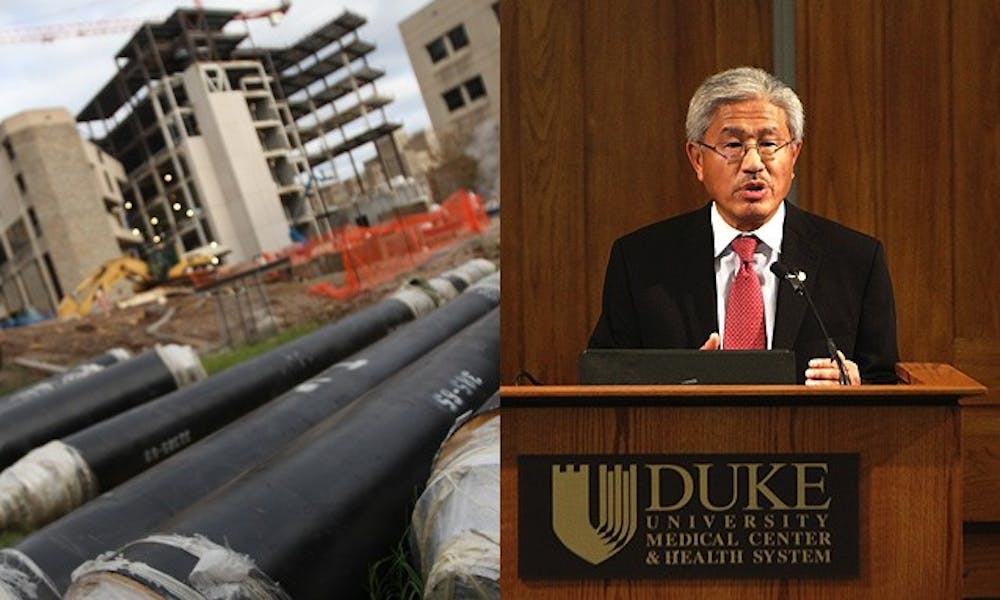Duke Med had its annual check-up, and its outlook is optimistic.
Dr. Victor Dzau, chancellor for health affairs and president and CEO of the Duke University Health System, praised the recent successes of DUHS in his annual State of Duke Medicine address Thursday but also described the need for change in light of uncertain economic times and federal health care legislation.
“I’m not President [Barack] Obama, but change is afoot, and we need to understand, and we need to embrace change,” Dzau said. “It’s an opportunity to lead, not to despair.”
Dzau began by acknowledging some of the health system’s successes from the past year. Dzau noted the recent hiring of 10 new department chairs as well as the arrival of Dr. Michael Kastan as executive director of the Duke Cancer Institute Aug. 1.
Dzau noted clinical successes within the health system during the past year, such as the development of the second largest lung transplant program in the country and a top-notch brain tumor program.
“We pretty much have implemented everything on task, if not beyond task,” Dzau said. “We have generally a very strong bottom line and reserve... to build a medical center of the future.”
Among the key strategic initiatives Dzau discussed were the new and ongoing construction projects for the Duke Medical Pavilion, the School of Medicine Learning Center and the Cancer Center.
Dr. Nancy Andrews, dean of the School of Medicine, and Catherine Gillis, dean of the School of Nursing and vice chancellor for nursing affairs, are two DUHS leaders doing a particularly strong job, Dzau said.
“[They] are knocking our socks off,” he said, noting the schools’ high U.S. News and World Report rankings. The Medical School is ranked No. 5, and the Nursing School has jumped from No. 42 to No. 7 in the last eight years.
The landscape for health care providers is changing, however, and the health system will have to respond, Dzau said.
“The demand for care is rising, but finances are getting ever more challenging,” he said. “We’re shifting from a great individualistic culture to a culture of teams, from autonomy to regulation.”
Dzau said he supported the Affordable Care Act, but noted that it will prompt complex restructuring of the health care system. The ACA, which was signed into law by Obama March 2010, calls for an expansion of coverage to 32 million uninsured Americans and includes measures designed to lower costs and improve efficiency. Dzau noted that some uncertainties remain about the reimbursements that hospitals will receive from government programs such as Medicare and Medicaid, especially given ongoing congressional efforts to rein in the federal deficit.
“I strongly believe this is a transformative act,” he said. “We all believe in it, but boy is it difficult to get through this.”
Without institutional change, DUHS finances could become precarious by 2016, Dzau said, noting that its operating margin could dip below the safe level of 5 percent. This situation will be avoided with innovative institutional change. Toward this end, Dzau announced the creation of four committees—with focuses such as clinical enterprise and research enterprise—to generate ideas and recommendations for Dzau and the Board of Trustees regarding how to reshape Duke Medicine.
“We need the participation of the stakeholders—our faculty, our administrators, the chairs—and people working together in a collaborative team-like approach, not one point of view but a collective point [of view],” Dzau said in an interview.
Dr. Andrew Muir, clinical director of hepatology and an attendee at the presentation Thursday, said he hopes the ACA will not significantly impact DUHS.
“We’re trying to be proactive but maintain our commitment to our mission,” Muir said. “We’ll see how it plays out.”
Other DUHS employees said they are optimistic for the future, given Dzau’s strategic plan.
“Victor Dzau has a very clear idea that is urgently needed for the future of Duke Medicine,” said Dr. Robert Jones, Mary and Deryl Hart professor of thoracic surgery. “These are some challenging times, and the health system will require some renovation—it will have to be an institution-wide effort.”
Get The Chronicle straight to your inbox
Signup for our weekly newsletter. Cancel at any time.

